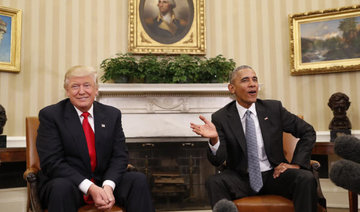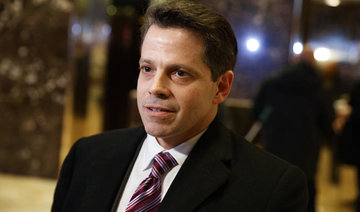MOSCOW: Russia’s communications regulator on Friday accused US TV channel CNN International of violating Russian media law and said it had summoned the broadcaster’s representatives in connection with the matter.
The regulator, Roskomnadzor, said in a statement on its website that it would look at warning the channel about the alleged violations which it said also breached the terms of its broadcast license.
Moscow accuses CNN International of violating Russian media law
Moscow accuses CNN International of violating Russian media law

YouTube sets sights on enhancing Saudi user experience with shift from smartphones to TV

- Platform’s executives gathered to reflect on its growth since its inception in 2005
- Pedro Pina took reporters back in time with a video of early meetings between the YouTube co-founders
ZURICH/RIYADH: YouTube is setting its sights on Saudi Arabia, aiming to shift video consumption from smartphones to television and leveraging the Kingdom’s affinity for the platform.
As it celebrates its 20th anniversary, the platform envisions a new era for the region, positioning YouTubers like Noor Stars as the next Hollywood stars. Additionally, YouTube is exploring artificial intelligence-enhanced experiences, including dubbing and other innovative features, to engage users on the big screen.
Pedro Pina, vice president of YouTube in Europe, the Middle East and Africa, told Arab News: “Whether you are talking about Egypt or Saudi Arabia, we want to be the zeitgeist of culture; we want to be the future of TV.
“As these countries pick up steam in terms of penetration in connectivity, it will happen.”
According to a study released by YouTube’s internal data, the platform reaches more than 12 million people in Saudi Arabia, over 2.5 million in the UAE, and 600,000 in Qatar over the age of 18 via connected TV.
Saudi Arabia has developed a significant affinity for YouTube, with 95.8 percent of the population using the platform. As YouTube looks to shift viewing from smartphones to television, it aims to enhance the way content is experienced by audiences in Saudi Arabia.
TV is now the primary device for YouTube viewing in the US, and viewers in the Middle East are shifting their viewing preferences from the smartphone to the TV.
During a two-day press gathering to mark YouTube’s anniversary, hosted in Zurich, the platform’s executives gathered to reflect on its growth since its inception in 2005, while highlighting future features and the vision for the region.
Executives who spoke about the evolution and progression of YouTube included Pina; Amjad Hanif, vice president of product management for YouTube creator products; Roya Zeitoune, head of YouTube’s culture and trends for Europe, the Middle East, and Africa; and Geoff van der Meer, vice president of engineering.
Pina took reporters back in time with a video of early meetings between the YouTube co-founders, showing them discussing the future of the platform.
He highlighted that between the co-founders, “there were a lot of conversations about where the site was going to be … and what they were going to do about the ability of uploading videos.”
As YouTube looks to the future, it has four areas of focus: remaining the epicenter of culture, creators becoming the startups of Hollywood, YouTube becoming the new television, and AI being implemented to enhance the experience for viewers and creators.
“Creators are continuing to be the new startups. Noor Stars is one of the creators who is incredibly successful in the region,” Pina said, adding that she represents one of the success stories in YouTube’s mission: “Give everyone a voice and show them the world. This has been our goal since we began.”
Pina highlighted the strong engagement YouTube receives from viewers across the Middle East, citing the region’s diverse cultures and varied realities.
When asked what new features can be expected in the region, Pina said: “The solutions will look and feel different in each country (in the Middle East) because they are in different levels of development.
“For example, the penetration of connected TVs is different in one type of country from another, and therefore the future of TV viewing for creators will also feel different from other regions.”
Among the topics executives discussed was podcasting. With podcasting becoming increasingly mainstream, Pina highlighted YouTube’s newly released statistic: Over 1 billion people interact with podcast content on YouTube each month, and those viewers are watching over 400 million hours of podcasts monthly on their TVs.
The rise of podcasting as a mainstream media format is not unexpected. As of now, the most viewed podcast episode on YouTube comes from Saudi Arabia’s Thmanyah, a sister publication of Arab News under SRMG, with 140 million views.
Another topic discussed was the YouTube Partner Program, which allows creators to have sustainable revenue and build a business while pursuing their passions through content creation.
According to YouTube’s internal data, in Saudi Arabia, the number of YouTube channels making seven figures or more in Saudi riyals is up 40 percent year on year. And in the UAE, the number of YouTube channels making seven figures or more in SR is up 15 percent year on year.
Hanif said that there are currently 3 million YouTubers in the partner program, and more than half a million of them started their channel over a decade ago.
Hanif added: “That speaks to the sustainability and the thoughtfulness we put into the program to make sure they are able to build a business this year, and YPP gives them the opportunity to continue to build and expand that business.”
The first YouTube video was uploaded on April 23, 2005, by Jawed Karim, one of the three co-founders of the platform. The video was titled “Me at the Zoo.” Since then, YouTube has grown exponentially, with over 20 billion videos uploaded as of April 2025.
Palestinian writer wins Pulitzer Prize for Gaza war commentary

- Mosab Abu Toha was awarded the $15,000 award for four of his essays published in The New Yorker
DUBAI: Renowned Palestinian poet and author Mosab Abu Toha won the Pulitzer Prize in commentary for his published essays documenting the suffering of people in Gaza.
Abu Toha was awarded the $15,000 award for four of his essays published in The New Yorker “on the physical and emotional carnage in Gaza that combine deep reporting with the intimacy of memoir to convey the Palestinian experience of more than a year and a half of war with Israel,” the Pulitzer board said.
Announcing his win, Abu Toha wrote on X: “Let it bring hope. Let it be a tale.”
The writer, who was born in a refugee camp in Gaza City, lost 31 family members in an airstrike on their home on Oct. 28, 2023 amid the war in Gaza.
He was detained by Israeli forces in November 2023 while trying to flee his home in northern Gaza, where he lived most of his life and was wounded aged 16 by an Israeli airstrike.
Abu Toha, along with his wife and three children, are now based in the US, where he received a Harvard fellowship for scholars at risk in 2019.
In a tribute post on Tuesday following his Pulitzer prize win, Abu Toha wrote on X: “Blessings to the 31 members of my family who were killed in one airstrike in 2023.
“Blessings to the soul of my great aunt, Fatima, whose ‘corpse’ remains under the rubble of her house since October 2024. Blessings to the graves of my grandparents who I will never find.”
Israeli soldiers raid home of Palestinian activist featured in Louis Theroux documentary

- Issa Amro posted videos on social media showing confrontations with Israeli soldiers, settlers at his home in Hebron
- The activist said ‘they wanted revenge from me for participating in the BBC documentary’
LONDON: Israeli soldiers have raided the home of Issa Amro, a prominent Palestinian activist featured in Louis Theroux’s recent BBC documentary “The Settlers,” in what he described as a retaliatory move for his appearance in the film.
Amro, co-founder of the non-violent group Youth Against Settlements, posted videos on social media showing confrontations with Israeli soldiers at his home in Hebron, as well as footage of Israeli settlers entering the property.
“The soldiers raided my house today, they wanted revenge from me for participating in the BBC documentary ‘the settlers’, after the army left the settlers raided my house, they injured one activist and cut the tree, they stole tools and the garbage containers,” he said in a post on X.
The incident comes as Israel intensifies its military operations in the West Bank, even as global attention remains focused on its war in Gaza. Human rights groups have long accused Israeli settlers — often accompanied or protected by soldiers — of conducting near-daily raids on Palestinian communities to intimidate residents and seize land.
The soldiers raided my house today, they wanted to revenge from me for participating in the @BBC documentary “ the settlers” , after the army left the settlers raided my house, they injured one activist and cut the tree, they stole tools and the garbage containers.
— Issa Amro عيسى عمرو (@Issaamro) May 3, 2025
The Israeli… pic.twitter.com/jYYYlr2XyS
Despite repeated condemnation by the international community, attacks by settlers and security forces have grown more frequent and more violent, forcing many Palestinians to abandon their homes.
Israeli settlements in the West Bank and East Jerusalem are considered illegal under international law. The expansion of settlements has drawn comparisons from rights organizations to the apartheid system once seen in South Africa.
Amro, a Nobel Peace Prize nominee, appeared in “The Settlers,” a follow-up to Theroux’s 2012 documentary “The Ultra Zionists.” In the new film, he guides Theroux through Israeli-occupied Hebron, where around 700 settlers live under heavy military protection among a Palestinian population of roughly 35,000.
The documentary not only examines the daily realities of life under occupation but also explores the religious and ideological motivations driving the settler movement.
Amro said Israeli police threatened him with arrest and told him not to file a complaint. In one video posted on X, he confronts balaclava-wearing soldiers and asks why their faces are covered. One responds: “You know exactly why.”
. @Issaamro who featured in The Settlers has posted videos of his latest harassment by settlers and soldiers. Our team has been in regular contact with him since the documentary and over the last 24 hours. We are continuing to monitor the situation. https://t.co/asEWKkVX5h
— Louis Theroux (@louistheroux) May 4, 2025
Theroux commented on X that his team is in regular contact with Amro and is “continuing to monitor the situation.”
The incident echoes a similar case in March, when Hamdan Ballal, a co-director of the Oscar-winning documentary “No Other Land,” was assaulted outside his home in Susya, a village in the Masafer Yatta area of the West Bank, before being briefly detained. Ballal later claimed he was beaten while in custody and described the attack as “revenge for our movie.”
In a statement, a spokesperson for the Israel Defense Forces denied Amro’s claims, saying: “As the videos clearly show, the soldiers present on May 3 in the Hebron area were there to disperse the confrontation between Palestinian residents and Israeli civilians.”
Syria state TV relaunches, months after Assad’s ouster

- Following Assad’s fall, television channels, radio stations and outlets suspended broadcasting and publishing
- ‘We hope to rebuild national media and trust with Syrians,’ Information Minister Hamza Al-Mustafa said
DAMASCUS: Syrian state television officially relaunched on Monday with a trial broadcast almost five months after the ouster of longtime ruler Bashar Assad and following delays blamed on sanctions and dilapidated equipment.
After Syria’s new authorities took power in December, state media and other television channels, radio stations and outlets affiliated with Assad’s government suspended broadcasting and publishing.
At 5:00 p.m. (1400 GMT) on Monday, a presenter appeared on television screens, welcoming viewers and announcing the start of a test broadcast of Syria’s Alekhbariah television channel from Damascus via two satellite providers.
The channel showcased its new branding and broadcast images of Damascus and Ummayad Square, where the Public Authority for Radio and Television headquarters are located, as well as images of correspondents across the country.
“Today, the first official television channel has launched,” said new authority chief Alaa Bersilo, vowing it would be “a mediator between the state and society.”
He said broadcasting was delayed several times “due to television infrastructure” and “sanctions on the former regime which impacted satellite broadcast efforts.”
The channel’s director Jamil Srur said: “We were keen on Alekhbariah being fit for the new Syria, and this is what delayed its launch.”
In a post on X, Information Minister Hamza Al-Mustafa called the launch “a very emotional moment,” expressing hope that the channel would be help rebuild the national media and be a model for “rebuilding trust” with Syrians.
After forces led by Islamist group Hayat Tahrir Al-Sham (HTS) took Damascus on December 8 and announced Assad’s overthrow, state news agency SANA stopped operating for more than a day before resuming with new staff.
But state television failed to keep up with fast-evolving events, at first broadcasting archive footage and later ceasing transmissions.
The new authorities have cracked down on outlets that were close to the ousted government, particularly Al-Watan daily and Sham FM radio.
For decades, Syria’s ruling Baath party and the Assad family dynasty heavily curtailed all aspects of daily life, including freedom of the press and expression, while the media became a tool of those in power and the entry of foreign media was heavily restricted.
Since Assad’s fall, outlets in exile or in formerly opposition areas have come to prominence, and foreign journalists have flooded in.
Syria ranks 177 out of 180 countries and territories on the 2025 World Press Freedom Index published by the Paris-based Reporters Without Borders (RSF).
While Assad’s ouster ended “five decades of brutal and violent repression of the press... journalists’ newfound freedom remains fragile due to ongoing political instability and mounting economic pressures,” according to RSF.
Google has launched new film and TV production wing, Business Insider reports

- Move could help it capitalize on an industry reeling from rising production costs and potential US tariffs
- Google is looking to boost the visibility and adoption of its newer offerings including AI and spatial computing tools
LONDON: Google has launched a new film and TV production initiative to scout projects it could fund or co-produce, Business Insider reported, a move that could help it capitalize on an industry reeling from rising production costs and potential US tariffs.
The initiative, called “100 Zeros,” is a multi-year partnership with Range Media Partners, a talent firm and production company known for its work on films including “A Complete Unknown” and “Longlegs,” according to the report on Monday.
Alphabet-owned Google is looking to boost the visibility and adoption of its newer offerings including AI and spatial computing tools that blend the physical and virtual worlds through the initiative, which backed the marketing of indie horror film “Cuckoo” last year, the report said.
100 Zeros is among the producers for “Cuckoo,” according to entertainment-focused social platform Letterboxd.
Google did not immediately respond to a Reuters request for comment.
The reported move comes as Hollywood grapples with higher costs after twin strikes in 2023 by actors and writers, as well as the threat of US tariffs on foreign-made films.
Google already has a partnership with Range Media — it announced last month the companies would work together over the next 18 months to commission films about AI. The first two films from the venture — called “Sweetwater” and “LUCID” — are set to release later this year.
Using Hollywood’s cultural clout could also help the tech giant in the AI race as it rushes to drive up adoption of its services such as Gemini, which competes with the likes of OpenAI’s ChatGPT.
The company, however, is not looking at YouTube as a primary distribution platform for 100 Zeros’ work, Business Insider reported, adding the goal instead was to sell projects to traditional studios and streamers such as Netflix.
YouTube had ventured into original programming in 2016 with the launch of “YouTube Originals.” The project was shuttered in 2022 as it pivoted back to its core focus on user-generated videos and ramped up its TikTok-style short-form offering, Shorts.






















